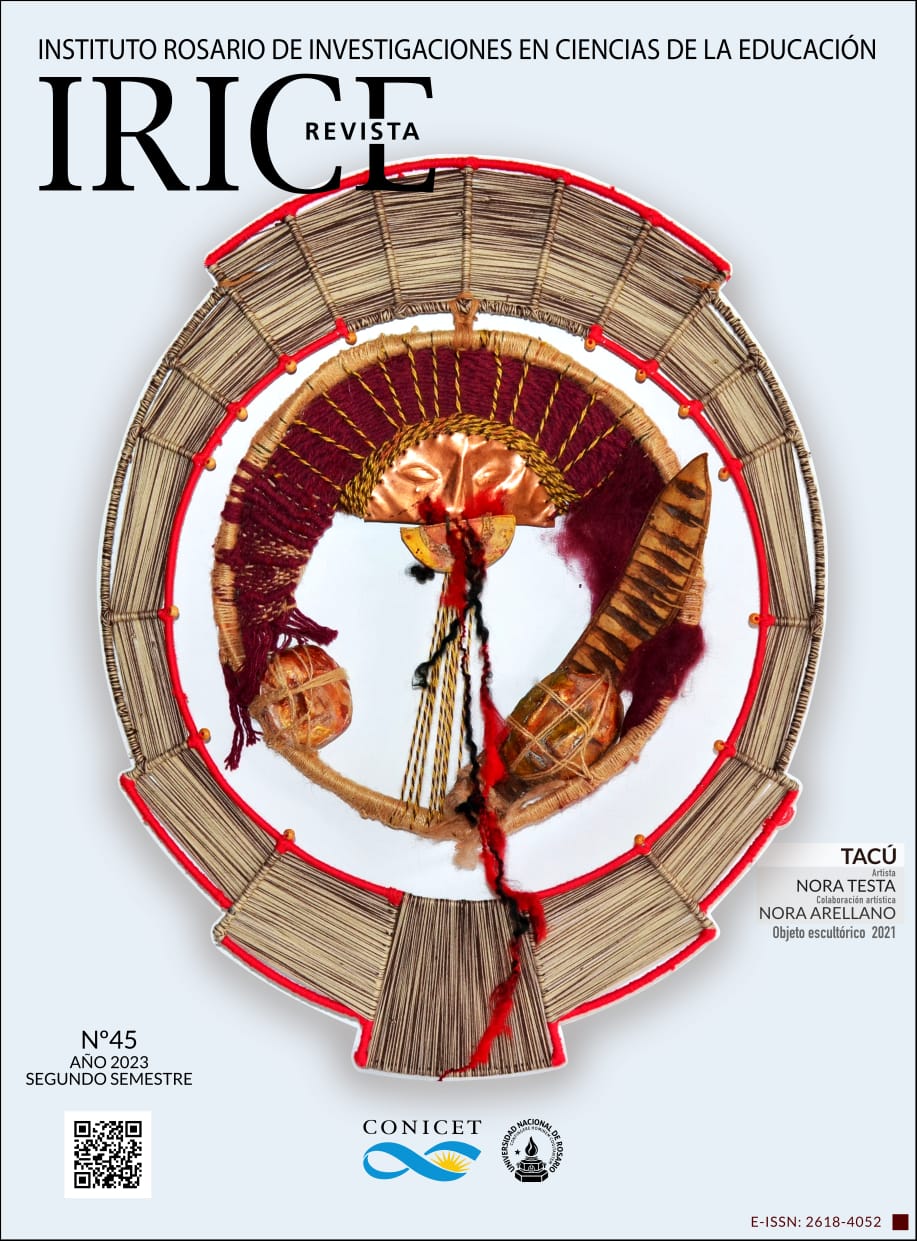Psychological capital, meaningful work and job satisfaction in Argentine teachers
DOI:
https://doi.org/10.35305/revistairice.vi45.1746Keywords:
job satisfaction, psychological capital, meaningful work, teachersAbstract
Although several studies account for the psychosocial risk experiences of teaching job, only a few have been interested in exploring psychological resources and positive job attitudes. The aim of this study was to analysed the interrelationships between psychological capital, meaningful work, job satisfaction, and sociodemographic variables. A quantitative correlational-explanatory investigation was designed. A sample of 520 Rafaela´s teachers was integrated, according to a sampling by availability. The variables of interest were measured using Likert-type scales with adequate psychometric properties. Total, indirect, and direct effects were calculated using bootstrapping analysis. Measures of lineal correlation, association, and mean difference were obtained based on sociodemographic variables. The results indicate positive correlations between the variables of interest; as well as statistically significant associations with teacher degree and educational level in which they work. Likewise, differences in means were observed in psychological capital, job satisfaction and meaningful work based on these sociodemographic variables. Indirect effects of psychological capital (through the mediation of meaningful work) on job satisfaction were found, corroborating a partial mediation. The main implications of the findings underline the need to encourage a positive perception of the teacher role and job, to promote training instances, and to provide resources and organizational practices that facilitate the job well-being of this professional group.
Downloads
References
Albrecht, S., Green, C., & Marty, A. (2021). Meaningful work, job resources, and employee engagement. Sustainability, 13, 4045. https://doi.org/gn6d8t
Allan, B., Dexter, C., Kinsey, R., & Parker, S. (2018). Meaningful work and mental health: Job satisfaction as a moderator. Journal of Mental Health, 27(1), 38-44. https://doi.org/gd8d4h
Ato, M., López, J. J., & Benavente, A. (2013). Un sistema de clasificación de los diseños de investigación en psicología. Anales de Psicología, 29(3), 1038-1059. https://doi.org/chxj
Bagozzi, R., & Yi, Y. (2012). Specification, evaluation, and interpretation of structural equation models. Journal of the Academy of Marketing Science, 40, 8-34. https://doi.org/dn953s
Bailey, C., Yeoman, R., Madden, A., Thompson, M., & Kerridge, G. (2019). A review of the empirical literature on meaningful work: Progress and research agenda. Human Resource Development Review, 18(1), 83-113. https://doi.org/gftkrd
Baker, C. N., Peele, H., Daniels, M., Saybe, M., Whalen, K.,Overstreet, S., & Trauma-Informed Schools Learning Collaborative The New Orleans (2021). The experience of COVID-19 and its impact on teachers’ mental health, coping, and teaching. School Psychology Review, 50(4), 491-504. https://doi.org/gnknc6
Bhatnagar, J., & Aggarwal, P. (2020). Meaningful work as a mediator between perceived organizational support for environment and employee eco-initiatives, psychological capital and alienation. Employee Relations, 42(6), 1487-1511. https://doi.org/gmpbh2
Carter, J. W., & Youssef‐Morgan, C. M. (2019). The positive psychology of mentoring: A longitudinal analysis of psychological capital development and performance in a formal mentoring program. Human Resource Development Quarterly, 30(3), 383-405. https://doi.org/ksxk
Casimiro Urcos, W., Casimiro Urcos, N., Barbachán Ruales, E., & Casimiro Urcos, J. (2020). Stress, anguish, anxiety and resilience of university teachers in the face of Covid-19. Utopía y Praxis Latinoamericana, 25(7), 453-463.
Dutton, J., Roberts, L., & Bednar, J. (2020). Prosocial practices, positive identity, and flourishing at work. En S. Donaldson, M. Csikszentmihalyi & J. Nakamura (Eds.), Positive psychological science. Improving everyday life, well-being, work, education, and societies across the globe (pp. 51-67). Routledge. https://doi.org/ksxn
Ferradás, M., Freire, C., García-Bértoa, A., Núñez, J., & Rodríguez, S. (2019). Teacher profiles of psychological capital and their relationship with burnout. Sustainability, 11, 5096. https://doi.org/ght3ck
Fredrickson, B. (2013). Positive emotions broaden and build. En P. Devine & A. Plant (Eds.), Advances in Experimental Social Psychology (pp. 1-53). Academic Press. https://doi.org/b9mn
Hair, J. E., Black, W. C., Babin, B. J., Anderson, R. E., & Tatham, R. L. (2019). Multivariate data analysis (6ª ed.). Pearson-Prentice Hall.
Hopwood, C., Bleidorn, W., & Wright, A. (2022). Connecting theory to methods in longitudinal research. Perspectives on Psychological Science, 17(2), 884-894. https://doi.org/gnpffm
Humphrey, S., Nahrgang, J., & Morgeson, F. (2007). Integrating motivational, social, and contextual work design features: A meta-analytic summary and theoretical extension of the work design literature. Journal of Applied Psychology, 92(5), 1332-1356. https://doi.org/dch52t
Igartua, J., & Hayes, A. (2021). Mediation, moderation, and conditional process analysis: Concepts, computations, and some common confusions. The Spanish Journal of Psychology, 24, e49. https://doi.org/gnfpsz
Jarden, R., Jarden, A., Weiland, T., Taylor, G., Bujalka, H., Brockenshire, N., & Gerdtz, M. (2021). New graduate nurse wellbeing, work wellbeing and mental health: A quantitative systematic review. International Journal of Nursing Studies, 121, 103997. https://doi.org/grbbxv
Judge, T., Weiss, H. M., Kammeyer-Mueller, J., & Hulin, C. (2017). Job attitudes, job satisfaction, and job affect: A century of continuity and of change. Journal of Applied Psychology, 102(3), 356-374. https://doi.org/f9zrh6
Kulekci Akyavuz, E. (2021). Teachers’ perceptions of positive psychological capital: A mixed method approach. International Journal of Research in Education and Science (IJRES), 7(3), 933-953. https://doi.org/ksxp
Lizana, P., Vega-Fernadez, G., Gomez-Bruton, A., Leyton, B., & Lera, L. (2021). Impact of the COVID-19 pandemic on teacher quality of life: A longitudinal study from before and during the health crisis. International Journal of Environmental Research and Public Health, 18(7), 3764. https://doi.org/gkrzkm
Lu, H., Zhao, Y., & While, A. (2019). Job satisfaction among hospital nurses: A literature review. International Journal of Nursing Studies, 94, 21-31. https://doi.org/dc3g
Luthans, F., & Youssef-Morgan, C. (2017). Psychological capital: An evidence-based positive approach. Annual Review of Organizational Psychology and Organizational Behaviour, 4(1), 339-366. https://doi.org/gf85cd
Monetti, E., & Baigorria, L. (2022). Enseñar en la universidad en tiempos de COVID-19: una mirada desde la docencia universitaria. Revista IRICE, 42, 121-150. https://doi.org/ksxq
Nawrin, R. (2018). Mediating role of meaningful work between resources and work engagement in Bangladesh’s private banks. Management & Marketing-Challenges for the Knowledge Society, 13(1), 777-795. https://doi.org/ksxr
Omar, A., Salessi, S., & Urteaga, F. (2014). Diseño y validación de una nueva escala para medir capital psicológico. Liberabit, 20(2), 315-323.
Salessi, S. (2020). Capital psicológico, pasión por el trabajo y comportamiento innovador: un estudio exploratorio con docentes santafesinos. Revista de Psicología, 19(1), 88-103. https://doi.org/ksxs
Salessi, S. (2022). Capital psicológico, satisfacción laboral y compromiso organizacional en tiempos de covid-19: un estudio con docentes argentinas. Revista Puertorriqueña de Psicología, 33(2), 244-257. https://doi.org/ksxv
Salessi, S., de Andrade, A., & Omar, A. (2020). Factorial invariance of the generic job satisfaction scale in Argentina and Brazil. Actualidades en Psicología Latinoamericana. 38(2), 1-14. https://doi.org/ksxx
Salessi, S., & Omar, A. (2017). Satisfacción laboral: un modelo explicativo basado en variables disposicionales. Revista Colombiana de Psicología, 26(2), 329-345. https://doi.org/gmfjwc
Salessi, S., & Postai, L. (2023).Resiliencia y compromiso organizacional en enfermeros argentinos. El rol mediador del trabajo significativo. En Fundación para la Cooperación, Investigación y Desarrollo de la Enfermería (Ed.), Memorias del X Congreso Internacional Virtual Iberoamericano de Enfermería (pp. 236-242). FUNCIDEN.
Schnell, T., & Hoffmann, C. (2020). ME-Work: development and validation of a modular meaning in work inventory. Frontiers in Psychology, 11, 599913.https://doi.org/ksxz
Sun, B., Guo, H., Xu, L., & Ding, F. (2022). How does teachers’ psychological capital influence workplace well-being? A moderated mediation model of ego-resiliency and work-meaning cognition. International Journal of Environment. Research on Public Health, 19, 14730. https://doi.org/gsdgqf
Tabachnick, B., & Fidell, L. S. (2019). Using multivariate statistics (7ª ed.). Pearson.
Tee, E. (2020). Uncovering the trail of positive affect in the job attitudes literature: A systematic review. Asian Journal of Social Psychology, 23, 54-68. https://doi.org/ksx2
Tommasi, F., Ceschi, A., & Sartori, R. (2020). Viewing meaningful work through the lens of time. Frontiers in psychology, 11, 585274. https://doi.org/gjtk3w
Ventura-León, J., & Caycho-Rodríguez, T. (2017). El coeficiente Omega: un método alternativo para la estimación de la confiabilidad. Revista Latinoamericana de Ciencias Sociales, Niñez y Juventud, 15(1), 625-627.
Wong, K., & Moorhouse, B. (2020). The impact of social uncertainty, protests, and COVID-19 on Hong Kong teachers. Journal of Loss and Trauma. International Perspectives on Stress & Coping, 25(8), 649-655. https://doi.org/ksx3
Published
How to Cite
Issue
Section
License
Copyright (c) 2023 Solana Salessi

This work is licensed under a Creative Commons Attribution-NonCommercial-ShareAlike 4.0 International License.
Authors who publish with this journal agree to the following terms:
Authors will retain their copyright and grant the journal the right of first publication of their work, which will simultaneously be licensed under the Creative Commons Attribution-NonCommercial-ShareAlike 4.0 License.
Authors may enter into separate, additional non-exclusive licensing agreements for the distribution of the published version of the work (e.g., depositing it in an institutional repository or publishing it in a monographic volume), provided that the initial publication in this journal is acknowledged.
Authors are permitted and encouraged to disseminate their work online (e.g., in institutional repositories or on their personal websites) prior to and during the submission process, as this can lead to productive exchanges and increase the visibility and citation of the published work. (See The Open Access Effect).





















